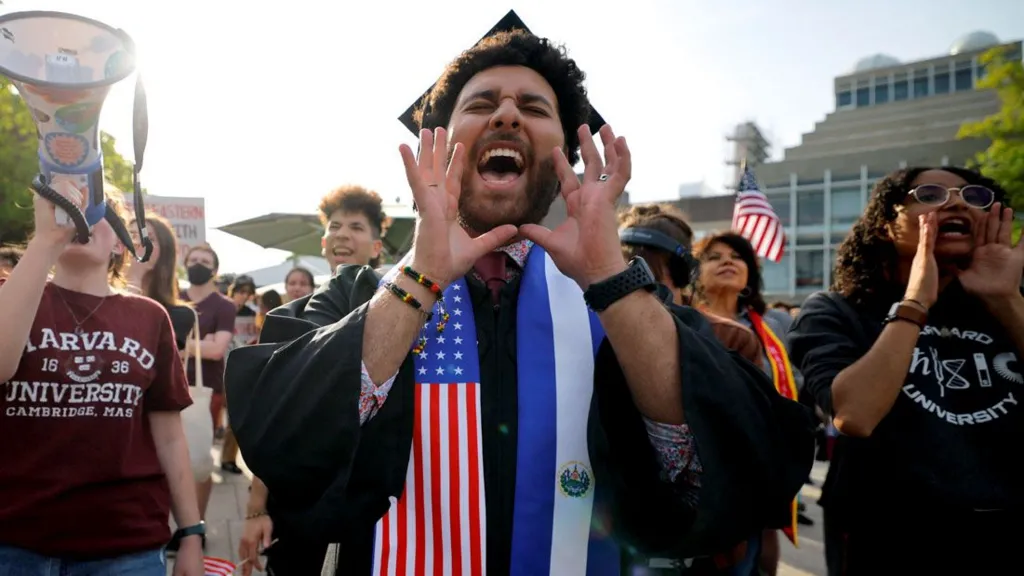The Trump administration has ordered U.S. embassies worldwide to halt the scheduling of new student visa interviews, as part of an initiative to broaden the social media scrutiny of applicants seeking to study in the United States.
According to an internal memo, the U.S. State Department plans to “expand required social media screening and vetting” for individuals applying for student and foreign exchange visas. The document notes that these changes will have “significant implications” for embassy and consulate operations around the globe.
This move coincides with an aggressive campaign by former President Donald Trump targeting prestigious American universities, which he views as strongholds of left-wing ideology. Trump has accused them of failing to adequately address antisemitism during recent waves of pro-Palestinian campus protests.
In response to the policy shift, a Chinese government official urged the U.S. to safeguard the rights of foreign students. “We urge the US side to earnestly safeguard the legitimate rights and interests of international students, including those from China,” the official stated. Chinese students constitute one of the largest international student populations in the U.S., numbering in the hundreds of thousands.
The potential impact on U.S. universities is also substantial. Many higher education institutions depend heavily on international students, who often pay full tuition fees, for both financial stability and academic diversity.
Typically, foreign students must schedule and attend in-person interviews at U.S. embassies as part of the visa approval process. However, the recent memo, obtained by CBS News, instructs embassies to cancel any open, unscheduled visa appointments for students. Interviews that are already booked may proceed as planned.
Secretary of State Marco Rubio wrote in the memo that the suspension of new appointments will remain in effect “until further guidance is issued.”
Although the memo outlines the expansion of social media vetting, it offers no specifics on what criteria will be used in the evaluations.
A State Department spokesperson, Tammy Bruce, addressed the issue on Tuesday, saying, “We take very seriously the process of vetting who it is that comes into the country, and we’re going to continue to do that.”
The Guardian previously reported in March that the Trump administration had already heightened surveillance of student applicants’ social media activity. The report tied these efforts to a broader response to growing pro-Palestinian activism on U.S. campuses.

In April, the Department of Homeland Security added fuel to the controversy by stating it would now consider “antisemitic activity on social media and the physical harassment of Jewish individuals as grounds for denying immigration benefit requests.”
In addition to the visa policy changes, Trump’s team has taken broader steps against universities—freezing hundreds of millions of dollars in federal funding, revoking thousands of student visas, and moving to deport international students. While some of these actions have been blocked by federal courts, others remain under legal review.
The White House has defended its actions by accusing certain universities of allowing pro-Palestinian protests to morph into antisemitic incidents. University leaders, however, argue that the administration is weaponizing policy to stifle free speech.
Critics contend the social media vetting initiative is yet another attempt to erode First Amendment protections. Trump, however, maintains that he is acting to “defend free speech” on campuses.
Harvard University has emerged as a central target of Trump’s crackdown. The administration has frozen $2.65 billion in federal grants to the institution and placed another $100 million in funding under scrutiny. Harvard’s president warned that the cuts would “hurt the country, not just Harvard,” citing the impact on government-prioritized research projects.
Just last week, Trump took further action by revoking Harvard’s authority to enroll international students and host foreign researchers—a decision that was swiftly blocked by a federal judge. If the policy is ultimately upheld, it could severely damage the university, where more than 25% of students are international. The move has already sparked student protests on Harvard’s campus near Boston.


 Trending
Trending 